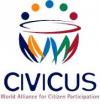By AG Publisher: APCNews
Published onPage last updated on
 On Monday April 29th, APC staff Alexandra Groome, Anriette Esterhuysen and Emilar Vushe attended the launch of CIVICUS’s State of Civil Society 2013 report at CIVICUS headquarters in Johannesburg, South Africa. This year’s theme, “creating an enabling environment for civil society,” draws on contributions from over 50 experts and documents the experiences of activists and non-governmental organisations worldwide.
On Monday April 29th, APC staff Alexandra Groome, Anriette Esterhuysen and Emilar Vushe attended the launch of CIVICUS’s State of Civil Society 2013 report at CIVICUS headquarters in Johannesburg, South Africa. This year’s theme, “creating an enabling environment for civil society,” draws on contributions from over 50 experts and documents the experiences of activists and non-governmental organisations worldwide.
APC’s contribution, written by Alexandra Groome, Anriette Esterhuysen, Avri Doria and Shawna Finnegan, discusses the role of information communication technology (ICT) in 2012/13 from a civil society perspective.
The article highlights some key emerging challenges and trends in internet governance, as well as how civil society can address negative trends. It explores the gap in usage of ICTs by citizens versus by states.
The internet and ICTs act as platforms for discourse, commerce, citizen engagement and political and social activism. They have enabled a higher volume of user-generated content, creating space for diversity of voices and issues to be heard which traditionally may have been ignored. ICTs have changed the face of the women’s rights movement by acting as an interface to document abuses, build knowledge and networking in the women’s movement. They have helped disseminate information, mobilise support and amplify the pressure for change.
However, the free and open nature of the internet is threatened both by states and business interests. Human rights issues related to ICTs have emerged in the last few years including freedom of expression, freedom of association, privacy, censorship, security, access to knowledge and the right to information. Citizens may have the opportunity to reap the benefits of ICTs, but it has come at a price; governments are now restricting access to ICTs and social networking websites, filtering and censoring content, carrying out surveillance, disruption of the activities of human rights defenders (HRDs), and more. According to CIVICUS, in 2012, 24 HRDs were killed and HRDs were attacked in 28 countries. Moreover, governments are increasingly requiring the private sector, including internet intermediaries such as internet service providers or mobile network operators, to exercise gatekeeper functions.
APC’s article concludes that “civil society must be involved in how the internet and other ICTs are regulated and governed at global, regional and national levels to ensure they remain tools for empowerment. The next few years will be critical as both states and large corporations try to consolidate control.”
Download the full report here
For more information about CIVICUS, visit the CIVICUS State of Civil Society webpage.
French and Spanish versions will be released early May 2013.


